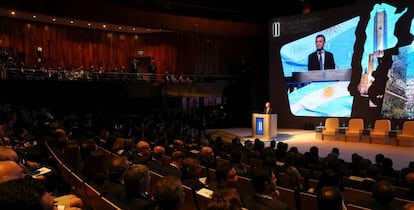As inflation falls in Argentina, business community optimistic crisis is over
Investors say economy is recovering, but there is little impact on consumption yet

Visitors to last week’s Argentina Business & Investment Forum in Buenos Aires will have had the opportunity to experience two parallel realities of the South American country. Inside the President Nestor Kirchner Cultural Center, in the capital’s former central post office, some 1,900 potential investors from 67 countries representing companies such as Coca Cola, BP, Dow Chemical and Siemens were gathered at a three-day event modeled on the Davos World Economic Forum. Generally, the mood was one of optimism among delegates about the reform-minded policies being implemented by the government of President Mauricio Macri, who took office in December 2015 and has promised to open up the country to foreign investment.

Outside on the streets of the capital, it is still a different story. Inflation and recession have hit the economy hard, with employment nudging 10% and industrial output down in July on the previous year by 7.9%. Nine months of austerity cuts have pushed 1.4 million people into poverty.
The reason for the new mood of optimism is that inflation – the curse of the Argentinean economy, and which has sunk just about every administration since the country returned to democracy in 1983 – shows signs of slowing down. In fact, the markets greeted the 0.2% figure for August with euphoria. Over the preceding months the figure had stubbornly stuck at around 3% a month, reaching an apocalyptic annual 42%.
There’s not going to be a boom, but little by little, things are getting better Economist Diego Coatz
After taking office in December, Macri suspended publication of inflation data pending an overhaul of the country’s economic statistics, which the International Monetary Fund has said were inaccurate under the previous government.
Inflation soared earlier this year after Macri removed currency controls, causing a 30% devaluation of the peso, as well as removing subsidies on energy bills, sending prices up by more than 500%.
But Macri was the first to admit that the inflation slowdown was due in large part to the Supreme Court’s decision earlier this month to annul a government attempt to raise domestic gas prices, which have long been heavily subsidized, by 800%.
The 30% annual salary increases, to be implemented in two stages, are beginning to take effect
“We all know that the tariff bid failed, but inflation will increase again. It will hover at around 1.5% a month for a couple of years until it settles down to a single figure per year,” said Macri.
That said, inflation is likely to accelerate in the coming months as the government gradually reintroduces gas price increases as part of Macri’s efforts to narrow a huge budget gap.
The business community in Argentina has recovered its optimism. Daniel Fernández, CEO of supermarket chain Carrefour Argentina, says the French-owned company saw a drop in sales in the first months of the year of around 5%, but that he is confident next year will pick up. “People have not yet noticed the recovery, but we believes that these salary increases will improve things. Inflation is clearly slowing down,” said one investor at the forum in Buenos Aires.
“I have been saying for the last month that the outlook is good,” says Miguel Bein, a former economic advisor to Macri’s Peronist rival Daniel Scioli: “We are seeing this in cement purchases and in construction. Also in consumption. This is normal, because there are five million people in receipt of 15% pay rises,” he adds, referring to the 30% annual salary increases agreed with Argentina’s powerful labor unions earlier this year, to be implemented in two stages, and that are beginning to take effect.
Inflation has sunk just about every administration since the country returned to democracy in 1983
Diego Coatz is chief economist for the country’s Industrial Union employers’ confederation, which has been hard hit by the crisis. “Production and activity are still very low, but since August have been improving. We have seen the worst of this, and now the important thing is to get inflation down from 20% a year. There’s not going to be a boom, but little by little, things are getting better: we’re optimistic without losing sight of reality,” he concludes. The mood might be brighter in the business community, but it has yet to be matched on the street.
English version by Nick Lyne.
Tu suscripción se está usando en otro dispositivo
¿Quieres añadir otro usuario a tu suscripción?
Si continúas leyendo en este dispositivo, no se podrá leer en el otro.
FlechaTu suscripción se está usando en otro dispositivo y solo puedes acceder a EL PAÍS desde un dispositivo a la vez.
Si quieres compartir tu cuenta, cambia tu suscripción a la modalidad Premium, así podrás añadir otro usuario. Cada uno accederá con su propia cuenta de email, lo que os permitirá personalizar vuestra experiencia en EL PAÍS.
¿Tienes una suscripción de empresa? Accede aquí para contratar más cuentas.
En el caso de no saber quién está usando tu cuenta, te recomendamos cambiar tu contraseña aquí.
Si decides continuar compartiendo tu cuenta, este mensaje se mostrará en tu dispositivo y en el de la otra persona que está usando tu cuenta de forma indefinida, afectando a tu experiencia de lectura. Puedes consultar aquí los términos y condiciones de la suscripción digital.








































